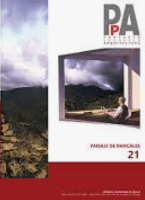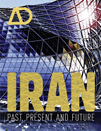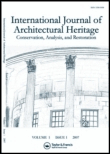
Disegnare Idee Immagini-Ideas Images
Scope & Guideline
Bridging Disciplines: Where Ideas Meet Imagery
Introduction
Aims and Scopes
- Interdisciplinary Approaches to Drawing and Architecture:
The journal focuses on the integration of various disciplines such as history, technology, and art in the study of drawing and architecture, fostering a holistic understanding of built environments. - Cultural Heritage and Preservation:
Significant attention is given to the representation and preservation of cultural heritage, emphasizing methodologies for documenting and interpreting historical sites and architectural works. - Narrative and Representation in Drawing:
The exploration of drawing as a narrative tool is a core theme, examining how drawings convey stories and ideas beyond mere representation. - Technological Innovations in Design:
The journal showcases advancements in digital tools and methodologies that enhance the practice of drawing and architectural representation, reflecting the evolving nature of the discipline. - Critical Analysis of Architectural History:
A consistent focus on analyzing historical architectural works and figures provides insights into their impact and relevance in contemporary contexts.
Trending and Emerging
- Digital Representation and Virtual Environments:
There is a growing emphasis on the use of digital tools and virtual environments for representation and analysis, indicating a shift towards more technologically-driven methodologies. - Sustainable and Resilient Design:
Recent publications reflect a heightened interest in sustainable practices and resilience in architecture, addressing the pressing global issues of climate change and environmental impact. - Interdisciplinary Collaboration:
The trend towards interdisciplinary research is evident, with increasing collaborations across fields such as digital media, cultural studies, and technology, enhancing the richness of architectural discourse. - Cultural and Emotional Aspects of Drawing:
An emerging focus on the emotional and nostalgic dimensions of drawing suggests a deeper exploration of how visual representation influences human experience and cultural memory. - Archaeological and Historical Analysis:
Papers that analyze archaeological sites and historical architecture are gaining prominence, reflecting a renewed interest in understanding the past to inform contemporary practices.
Declining or Waning
- Traditional Architectural Techniques:
There has been a noticeable decrease in the exploration of traditional architectural drawing techniques, which may indicate a shift towards more contemporary and digital methods. - Historical Architectural Styles:
Discussions centered around specific historical styles of architecture appear to be waning, possibly as the focus moves towards interdisciplinary and innovative approaches rather than style-specific analysis. - Local Case Studies in Urban Studies:
The frequency of papers focusing on localized case studies in urban transformations has diminished, suggesting a trend towards broader, more generalizable studies.
Similar Journals

Zograf
Showcasing cutting-edge research in archaeology and visual arts.Zograf is a distinguished open-access journal published by the University of Belgrade's Institute of Art History, Faculty of Philosophy, dedicated to the fields of Archeology, History, and Visual Arts and Performing Arts. With an ISSN of 0350-1361 and an E-ISSN of 2406-0755, Zograf has made substantial contributions to research within its domain since transitioning to open access in 2002. Situated in Serbia, the journal has achieved notable recognition, ranking in the Q1 category for both History and Visual Arts and Performing Arts, and in the Q2 category for Archeology in the recent 2023 evaluations. This positioning underscores its significance and influence among peers, making it an invaluable resource for researchers, academics, and students alike. The journal's commitment to disseminating high-quality scholarship facilitates interdisciplinary dialogue and advances knowledge in the humanities, while its open-access model ensures that research is freely available to a global audience. Zograf's editorial board comprises leading scholars who are dedicated to promoting innovative research that inspires future generations of scholars.

Disegnarecon
Innovating the dialogue between design and urban environments.Disegnarecon is a distinguished open access journal published by UNIV L AQUILA that has been contributing to the fields of architecture, urban studies, and the visual and performing arts since its inception in 2008. With an ISSN of 1828-5961, this journal serves as a pivotal platform for researchers, practitioners, and students to disseminate innovative ideas and findings. Renowned for its rigorous peer-review process, Disegnarecon has achieved notable rankings in 2023, securing a Q2 quartile in Architecture, a Q3 quartile in Urban Studies, and a prestigious Q1 quartile in Visual Arts and Performing Arts, highlighting its academic significance. The journal’s commitment to fostering interdisciplinary dialogue is further emphasized by its impressive Scopus ranks, where it stands at Rank #136 in Visual Arts and Performing Arts and Rank #96 in Architecture. Aimed at advancing knowledge and practice in its respective fields, Disegnarecon is an essential resource for anyone dedicated to exploring the intersections of design, culture, and urban environments, encouraging active participation in contemporary discourse.

Proyecto Progreso Arquitectura
Elevating scholarly dialogue in architecture and visual arts.Proyecto Progreso Arquitectura, an esteemed academic journal published by UNIV SEVILLA, EDITORIAL, is dedicated to advancing the fields of Architecture, Arts and Humanities, History, Urban Studies, and Visual Arts. With an Open Access model since 2010, this journal facilitates the dissemination of innovative research and critical discourse among a global audience, fostering collaboration and insight within the academic community. Operating from Seville, Spain, the journal has successfully carved a niche in the architectural and design studies landscape, currently positioned in the Q3 category in Architecture and Urban Studies, and Q2 in History and Visual Arts as of 2023, demonstrating its growing impact and reputation. With an ISSN of 2171-6897 and an E-ISSN of 2173-1616, it also ranks commendably in Scopus across various disciplines, offering readers an invaluable resource for scholarly articles that contribute to the vibrant dialogues in architecture and its intersection with societal developments. The journal's approach not only encourages academic rigor but also embraces the practical implications of research, making it an essential read for researchers, practitioners, and students alike.

Architektura & Urbanizmus
Bridging Theory and Practice in Urban DevelopmentArchitektura & Urbanizmus is a distinguished scholarly journal published by the Institute of History at the Slovak Academy of Sciences, with a specific focus on the fields of architecture, conservation, and urban studies. Since its transition to Open Access in 2021, the journal aims to broaden the accessibility of vital research findings to a global audience, fostering knowledge-sharing and collaboration among scholars, practitioners, and students alike. The journal has consistently contributed to the academic discourse since its inception and now spans converged years from 2007 to 2023, adapting to the evolving landscape of its disciplines. With its categorization in Q3 for both Architecture and Conservation, and Q4 in Urban Studies for 2023, it stands as a credible platform for disseminating innovative research and practical insights. The journal's current Scopus rankings reflect its growing influence in the field, offering a significant opportunity for researchers to contribute original work that addresses contemporary challenges in architecture and urban development. Situated in the heart of Bratislava, Slovakia, at Klemensova 19, Architektura & Urbanizmus invites contributions that enrich the architectural heritage and environmental integrity of urban spaces.

ARCHITECTURAL DESIGN
Inspiring the Future of Visual Arts and ArchitectureARCHITECTURAL DESIGN, a leading journal published by Wiley Periodicals, Inc., serves as a vital platform for discourse in the fields of architecture and visual arts. With an ISSN of 0003-8504 and an E-ISSN of 1554-2769, this esteemed publication offers comprehensive insights into contemporary design practices and emerging architectural theories. Established in the United States and continuously evolving from 2002 to 2024, the journal has secured a prominent position with a Q3 status in Architecture and an impressive Q1 ranking in Visual Arts and Performing Arts as of 2023. Its Scopus rankings further affirm its relevance, with a percentile ranking of 82nd in the Visual Arts category. Although it does not currently offer Open Access options, the journal remains dedicated to disseminating high-caliber research and innovative design strategies that engage a diverse readership of researchers, professionals, and students alike. The contributions published within its pages are instrumental in shaping the discourse around architecture, making ARCHITECTURAL DESIGN an indispensable resource for anyone passionate about the built environment.

ARCHITECTURAL RECORD
Cultivating Critical Perspectives in the Built EnvironmentARCHITECTURAL RECORD, published by McGraw Hill Inc, stands as a vital resource in the field of architecture and design, offering insightful perspectives and critical analyses that cater to architects, designers, and academia alike. With an ISSN of 0003-858X, this prestigious journal has been a cornerstone for the architectural community, providing a blend of contemporary practices and theoretical frameworks since its inception. Although it is not currently available through Open Access, its rich content contributes to the ongoing dialogue in both the Visual Arts and Performing Arts, as well as Engineering and Architecture disciplines. The journal's historical impact can be seen through its wide readership and influence in shaping architectural discourse, making it a highly regarded publication for professionals and students in the field. As a beacon of innovative practices, ARCHITECTURAL RECORD continues to inspire and educate, even despite its coverage discontinuation in Scopus since 2018.

International Journal of Architectural Heritage
Exploring Architectural Legacies, Inspiring Innovation.The International Journal of Architectural Heritage is a premier publication dedicated to the multidisciplinary fields of architecture, conservation, and visual arts. Published by TAYLOR & FRANCIS INC, this journal serves as a vital platform for scholars and practitioners who aim to advance knowledge in the preservation of cultural heritage and architectural innovation. With an impressive impact factor reflecting its critical acclaim, including rankings in the top quartile (Q1) across multiple categories in 2023, the journal is recognized as a key resource in Arts and Humanities, particularly in Visual Arts and Performing Arts and Conservation. Since its inception in 2007, the journal has consistently provided rigorous peer-reviewed research, offering enriching insights and fostering collaborations amongst students, researchers, and professionals committed to the future of architectural heritage. As it continues to influence the field through its diverse and impactful contributions, readers can expect to engage with leading-edge studies that not only illuminate current trends but also inspire innovative practices in safeguarding architectural legacies.

Cuaderno de Notas
Encouraging Collaboration Across Artistic DisciplinesCuaderno de Notas is a dedicated journal that serves as a platform for scholarly discourse within the realm of arts and humanities, published by UNIV POLITECNICA MADRID, ESCUELA TEC SUP ARQUIT, DEPT COMPOSICION ARQUITECT. With an ISSN of 1138-1590 and an E-ISSN of 2386-8376, this open-access journal has been committed to free dissemination of knowledge since 2009. As of 2023, it holds a Q4 ranking in the arts and humanities category, reflecting its emerging presence in the academic community with a Scopus rank of #483/552 and a 12th percentile standing. Cuaderno de Notas aims to foster interdisciplinary research and creative expression, making it an essential resource for researchers, artists, and students seeking to engage with contemporary issues in the arts and humanities. Its base in Madrid, Spain, positions the journal at the cultural crossroad of European and global artistic innovation, ensuring its contributions are both timely and relevant.

Architecture and Culture
Bridging Architecture and Cultural NarrativesArchitecture and Culture is an esteemed journal published by Routledge Journals, Taylor & Francis Ltd, focusing on the intersection of architecture, cultural studies, urbanism, and the visual and performing arts. Since its inception, this journal has become a vital platform for researchers, professionals, and students to explore the multifaceted relationship between architecture and cultural identity within contemporary contexts. With an ISSN of 2050-7828 and an E-ISSN of 2050-7836, the journal reaches a global audience from its base in the United Kingdom. Featuring a commendable Q2 ranking in Visual Arts and Performing Arts and a consistent presence in multiple relevant quartiles, including Q3 in both Architecture and Cultural Studies, it is well-regarded for its scholarly impact. The journal offers a unique opportunity for interdisciplinary dialogue, fostering innovative research that examines how built environments shape and are shaped by cultural narratives. This commitment to advancing knowledge in these fields is reflected in its ongoing publication from 2014 to 2024, making it a pivotal resource for those at the forefront of the discourse on architecture and culture.

Festival dell Architettura Magazine
Cultivating a Platform for Creative Architectural ExpressionFestival dell Architettura Magazine, published by FESTIVAL ARCHITETTURA EDIZIONI, is a distinctive Open Access journal dedicated to the realms of architecture, urban studies, and the visual and performing arts. Established with a vision to foster interdisciplinary dialogue, the journal has been a part of the academic landscape since 2013 and has converged its insightful contributions from 2018 to 2023. Despite being ranked in the lower quartiles in its respective categories—Q4 in Architecture and Urban Studies, and Q3 in Visual Arts and Performing Arts—this publication remains vital for emerging researchers and seasoned professionals alike, as it provides a platform for innovative ideas and practices from Italy and beyond. It serves as a key resource for those who wish to engage with contemporary architectural thought and cultural expressions, facilitating open access to research that highlights the intersections of space, society, and art.